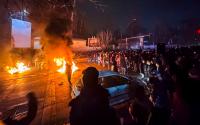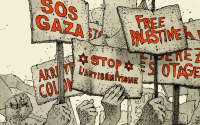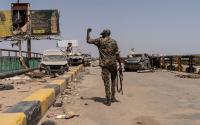5 December 2005Gregory Wilpert
Venezuelanalysis.com / Caracas, Venezuela. For the fourth time, Venezuela's opposition parties are undergoing a bizarre process implosion. Like lemmings, they are committing mass political suicide by withdrawing from one of the country's most important elections in the past five years. Following their support for the April 2002 coup attempt, the 2002/2003 oil industry shutdown, and the 2004 recall referendum, this is the fourth time opposition parties make a strategic miscalculation and end up following the course of the most extremist elements amongst them in seeking a shortcut to defeating Chavez. One can only hope that this presumably last error (because they will be practically gone after that) will mean the rebirth of a responsible and constitutional opposition in Venezuela. No doubt, this will be difficult with an almost entirely pro-Chavez National Assembly, but they will be left with no other option (other than foreign intervention). The greater danger, though, is that the boycott will open the door to more foreign intervention in Venezuela.
Recent Events
Nearly all major opposition parties declared this week that they would withdraw from the Sunday, December 4 elections for the country's legislature, the National Assembly. They took this action mere days after having promised to the Organization of American States (OAS) to participate in the vote. According to the OAS, the opposition parties, "expressed that save an extraordinary event, the guarantees offered to this date permit the elections to proceed as scheduled without any new requests from the political parties involved."
Despite this assurance, Acción Democrática (AD), the former social-democratic governing party, withdrew from the vote a mere day after reassuring the OAS and the Electoral Council. With 23 out of 165 seats in the National Assembly and practically the only opposition party with a national organization, it is Venezuela's most important opposition party. Next, Copei, the Christian-democratic former governing party, which has become practically meaningless during the Chavez years, withdrew. Proyecto Venezuela (Project Venezuela), followed suit the same day.
At first, the second most important party in Venezuela, Primero Justicia (PJ - Justice First), a conservative free market party, looked like it was more than happy to pick up the pieces and to become the inheritor of the suicidal parties. PJ party leaders said that they believed that they could trust the process, even if they did not trust the Electoral Council. However, a mere two days later, following continuous debate that nearly split the party, PJ mysteriously made a complete turn around and declared that it would not participate in the elections after all.
The withdrawal of PJ came as a great surprise. After all, PJ potentially had the most to lose because it is practically the only relatively strong party that is untainted by the discredit the pre-Chavez political class suffered as a result of Venezuela's steady 20-year economic decline. PJ is the only opposition party that would probably have at least held on to the seats it currently has in the National Assembly. Not only that, a strong showing would have positioned the party as the strongest opposition party in the country and would have propelled its presidential candidate, Julio Borges, as practically the default opposition candidate to run against Chavez in December 2006. It is no wonder, thus, that Borges was firmly opposed to his party's withdrawal.
The withdrawal of four important opposition parties is very significant for Venezuela because the December 4th National Assembly elections are a major milestone of the Chavez presidency. These elections will be crucial for Venezuelan politics for the next five years. Until now, the pro-Chavez coalition of parties has had only a very thin majority in the National Assembly. This meant that the opposition was occasionally able to block laws by extending debate and to prevent decisions that required a two-thirds majority, such as constitutional amendments, appointments to the Electoral Council and the Citizen Power (Attorney General, Human Rights Ombudsperson, and Comptroller General), and "organic laws" (laws mandated by the constitution). Opinion polls showed that prior to the opposition boycott, pro-Chavez forces had a good chance of winning such a two-thirds majority.
Motivations for Opposition Boycott
The opposition's main argument is that it has lost all trust in the CNE and is demanding its resignation as a condition for its participation. While it may well be true that the opposition does not trust the CNE, there are many other guarantees in place to make sure that the vote will proceed cleanly, such as over 400 independent observers from the Organization of American States, the European Union, and from various other countries around the world. Also, all political parties are involved in every step of organizing the election.
Finally, the CNE conceded to numerous opposition demands, such as manually auditing 45% of the paper ballots cast and eliminating the fingerprint scanners. So, if the technical arguments about not trusting the fairness of the vote are so weak and if the opposition stands to lose so much in the upcoming vote, then what other reasons could it have for boycotting the vote?
There are several alternative motivations for the opposition's action. The first is the result of a simple cost-benefit analysis. All opinion polls leading up to the vote indicated that it was quite probable that pro-Chavez parties would win a two-thirds majority in the National Assembly. The opposition probably reasoned that faced with the choice between participating and having a minimal voice in the legislature or no voice and a de-legitimized legislature, the latter option would be preferable in the long run. Part of this calculus was that the opposition is convinced that abstention will be high, thus increasing the likelihood of successfully de-legitimizing the election process.
One can find evidence of this type of reasoning in the repeated references the opposition has made to predictions of high abstention. According to the opposition, the vote was doomed from the start because its polls predicted an abstention rate as high as 80%. Chavez-supporters, on the other hand, were predicting a relatively normal turn-out, of 60-70%, which, of course, will be lower now due to the opposition boycott, but probably not too much lower. Given the opposition's poor track record in predicting political events in Venezuela during the Chavez presidency, it seems unlikely that the opposition's prediction will be correct.
One can find another piece of evidence for the opposition's strategic reasoning in the fact that the first party to declare its boycott of the vote was Acción Democrática, a party that theoretically had the most to lose from non-participation, but which ran no campaign whatsoever in the weeks leading up to the election. In general, opposition parties campaigned extraordinarily little, but AD did not seem to post a single campaign poster. In other words, no matter what the outcome of the negotiations with the CNE, it seems AD never intended to run in the elections. It was all a charade in order to snatch a strategic victory from the jaws of certain electoral defeat.
The second reason the opposition probably opted for a boycott has to do with an odd psychological dynamic within the opposition itself. That is, every time the opposition must make a major decision, it almost invariably steers towards the more extremist options and against any kind of moderation. This was clearly the case during the April 2002 coup attempt and the December 2002 to February 2003 shutdown of the oil industry. In both cases, the most extremist elements within the opposition had their way. Part of the reason for this seems to have to do with a macho culture, in which moderation is seen as cowardice and extremism as courage. Whenever extremists and moderates face off in Venezuela, the extremists seem to win.
The third possible reason the opposition parties withdrew has to do with pressure they probably received from the U.S. While this is speculative, the history of U.S. policy in the region shows that the U.S. has a record of supporting and profiting from electoral boycotts. Also, the U.S. is in a good position to pressure the Venezuelan opposition, given the $20 million of funding it has provided opposition groups over the past five years. The U.S., of course, denies any involvement in the opposition's decision.
Still, it served U.S. interests very well when opposition parties boycotted the 1994 Nicaraguan elections and when opposition parties boycotted the 2000 elections in Haiti. In each case, the boycott set the stage, in international opinion, to de-legitimize and smooth the path for the eventual defeat of left-leaning governments.
Probable consequences
Venezuela
As stated at the outset, the most likely short and medium term consequence of the opposition's boycott will be the disappearance of the opposition. Even now, many opposition extremists believe that this action of theirs means the imminent end of Chavez. However, just as they turned out to be completely wrong in the days leading up to the April 2002 coup, the December 2002 oil industry shutdown, and the August 2004 recall referendum, they will be wrong once again. Given their complete misinterpretation and misunderstanding of Venezuelan reality, so many serious errors must inevitably lead to their own demise.
The traditional opposition to Chavez in Venezuela will no longer be represented in the next National Assembly, which is supposed to preside for five years. The opposition will thus have lost its second to last platform. The first platform it lost was within the military, following the coup attempt. The second platform was within the oil industry, following its shutdown and recovery. The third was with its own supporters, following the failed recall referendum. The last two opposition platforms that are left are the National Assembly and the private mass media. In other words, the only platform the opposition will have after December 4 is the mass media.
Julio Borges and Manuel Rosales, two of the most likely candidates to oppose Chavez in the December 2006 presidential elections, will not be able to count on a national institutional infrastructure, which the National Assembly provides, for launching their campaign. Their ability to challenge Chavez will thus be greatly diminished.
In the medium term, it is to be hoped and it seems quite probable, that a new opposition will emerge, partly from within Chavez's ranks and partly from old opposition ranks that had nothing to do with the opposition's failed adventures of the past six years. With the emergence of such an opposition, hopefully, Venezuela will finally be able to return to a more "normal" give and take between governing parties and opposition, something which has been lacking nearly completely ever since Chavez was first elected in 1998. Unfortunately, there are likely international consequences that will interfere with such normalization.
International Consequences
Just as it did in Haiti and Nicaragua, the Bush administration will no doubt use the December 4 opposition boycott to discredit and de-legitimize the Chavez government, regardless of what the international observers have to say about the vote. In other words, every time there is a political conflict, when the government passes a controversial law or constitutional amendment, or makes an important appointment, Bush administration officials will try to cast doubt on the legitimacy of such endeavors. This gradual disqualification of the Chavez government would presumably soften the ground for eventual stronger intervention, such as greater and more overt support for the opposition in Venezuela, in the hopes of unseating Chavez in 2006 or some other future election.
A second and perhaps more dangerous consequence of the boycott is that it sets a precedent for the rest of Latin America. There are seven presidential elections coming up in Latin America in 2006. Events in Venezuela could tempt opposition parties in these countries into making a similar cost-benefit analysis as the Venezuelan opposition made and cause them to calculate that de-legitimizing the electoral process in their country is preferable to facing near certain defeat at the polls. Such a turn of events would mean a dangerous weakening of democracy throughout Latin America for many years to come.
The political suicide of Venezuela's opposition is thus a mixed turn of events. On the one hand, it could mean the end to a failed opposition and the rebirth of normal politics in Venezuela. On the other hand, it could open the door for more destabilization from outside for both Venezuela and the rest of Latin America. In balance, it would have been preferable, though, for both the opposition and for Venezuela as a whole, if the opposition had not made yet another mistake as it now made with the elections boycott.
http://www.zmag.org/sustainers/content/2005-12/05wilpert.cfm






